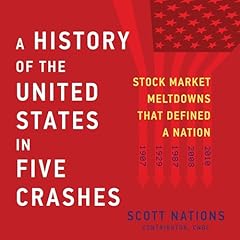
How the World Ran Out of Everything
Inside the Global Supply Chain
No se pudo agregar al carrito
Add to Cart failed.
Error al Agregar a Lista de Deseos.
Error al eliminar de la lista de deseos.
Error al añadir a tu biblioteca
Error al seguir el podcast
Error al dejar de seguir el podcast
Obtén 3 meses por US$0.99 al mes
 Exclusivo para miembros Prime: ¿Nuevo en Audible? Obtén 2 audiolibros gratis con tu prueba.
Exclusivo para miembros Prime: ¿Nuevo en Audible? Obtén 2 audiolibros gratis con tu prueba.
Compra ahora por $25.19
-
Narrado por:
-
Michael David Axtell
-
De:
-
Peter S. Goodman
By the New York Times’s Global Economics Correspondent, an extraordinary journey to understand the worldwide supply chain—exposing both the fascinating pathways of manufacturing and transportation that bring products to your doorstep, and the ruthless business logic that has left local communities at the mercy of a complex and fragile network for their basic necessities.
""A tale that will change how you look at the world."" —Mark Leibovich
Named a Best Book of the Year by Foreign Policy and The Aspen Institute * Longlisted for the Porchlight Business Book Award
How does the wealthiest country on earth run out of protective gear in the middle of a public health catastrophe? How do its parents find themselves unable to locate crucially needed infant formula? How do its largest companies spend billions of dollars making cars that no one can drive for a lack of chips?
The last few years have radically highlighted the intricacy and fragility of the global supply chain. Enormous ships were stuck at sea, warehouses overflowed, and delivery trucks stalled. The result was a scarcity of everything from breakfast cereal to medical devices, from frivolous goods to lifesaving necessities. And while the scale of the pandemic shock was unprecedented, it underscored the troubling reality that the system was fundamentally at risk of descending into chaos all along. And it still is. Sabotaged by financial interests, loss of transparency in markets, and worsening working conditions for the people tasked with keeping the gears turning, our global supply chain has become perpetually on the brink of collapse.
In How the World Ran Out of Everything, award-winning journalist Peter S. Goodman reveals the fascinating innerworkings of our supply chain and the factors that have led to its constant, dangerous vulnerability. His reporting takes readers deep into the elaborate system, showcasing the triumphs and struggles of the human players who operate it—from factories in Asia and an almond grower in Northern California, to a group of striking railroad workers in Texas, to a truck driver who Goodman accompanies across hundreds of miles of the Great Plains. Through their stories, Goodman weaves a powerful argument for reforming a supply chain to become truly reliable and resilient, demanding a radical redrawing of the bargain between labor and shareholders, and deeper attention paid to how we get the things we need.
From one of the most respected economic journalists working today, How the World Ran Out of Everything is a fiercely smart, deeply informative look at how our supply chain operates, and why its reform is crucial—not only to avoid dysfunction in our day to day lives, but to protect the fate of our global fortunes.
Los oyentes también disfrutaron:




















Las personas que vieron esto también vieron:


















Eye opening !!!!!
Se ha producido un error. Vuelve a intentarlo dentro de unos minutos.
Interesting, despite the socialist overtones
Se ha producido un error. Vuelve a intentarlo dentro de unos minutos.
Great insight into the relationship intertwining global logistics, corporate interests, and political interests
Se ha producido un error. Vuelve a intentarlo dentro de unos minutos.
An excellent and insightful book
Se ha producido un error. Vuelve a intentarlo dentro de unos minutos.
of information down to a human level. A must read.
wish the author narrated the book
Se ha producido un error. Vuelve a intentarlo dentro de unos minutos.


